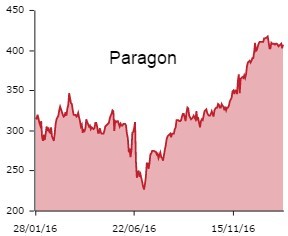Specialist lender Paragon Group of Companies (PAG) has met profit expectations despite regulatory changes and uncertainty following the UK’s decision to leave the European Union.
The mid-cap firm says good underlying trends in volumes, margins, cost control and bad debt helped to drive operating profits of £33.1m from 1 October to 31 December.
Shares in Paragon nudge 1% higher to 407p.
Its common equity tier 1 ratio (CET1), which compares equity capital to its risk-weighted assets, is up to 16.1%, which suggests the lender will perform well in adverse economic conditions.
Its debt purchasing division Idem Capital reports strong trading with £95.4m of investments, which is impressive as vendors temporarily withdrew from the market after the Brexit vote.
Broker Numis analyst James Hamilton is conflicted about the stock as its balance sheet and pipeline was stronger than expected, but profitability was lower than his forecast of £35.2m.
Hamilton expects its buy to let (BTL) division, Paragon Mortgages, to struggle in 2017 as regulations from the Prudential Regulation Authority (PRA) and tax changes impact BTL investors.
In 2016, lenders tightened criteria about rental stress tests and affordability checks before the PRA regulations came into effect on 1 January.
Over the last quarter, Paragon Bank agreed mortgages for rental properties worth £185.2m, which has dropped by more than 50% from £400.9m in the first quarter of 2016.
UBS analyst Ivan Jevremovic is more optimistic recognising that profit was slightly held back by the carry cost of bonds due to mature in April.
‘The combination of gathering momentum in lending and reducing funding costs should support profit growth into the rest of the year’ says Jevremovic.



